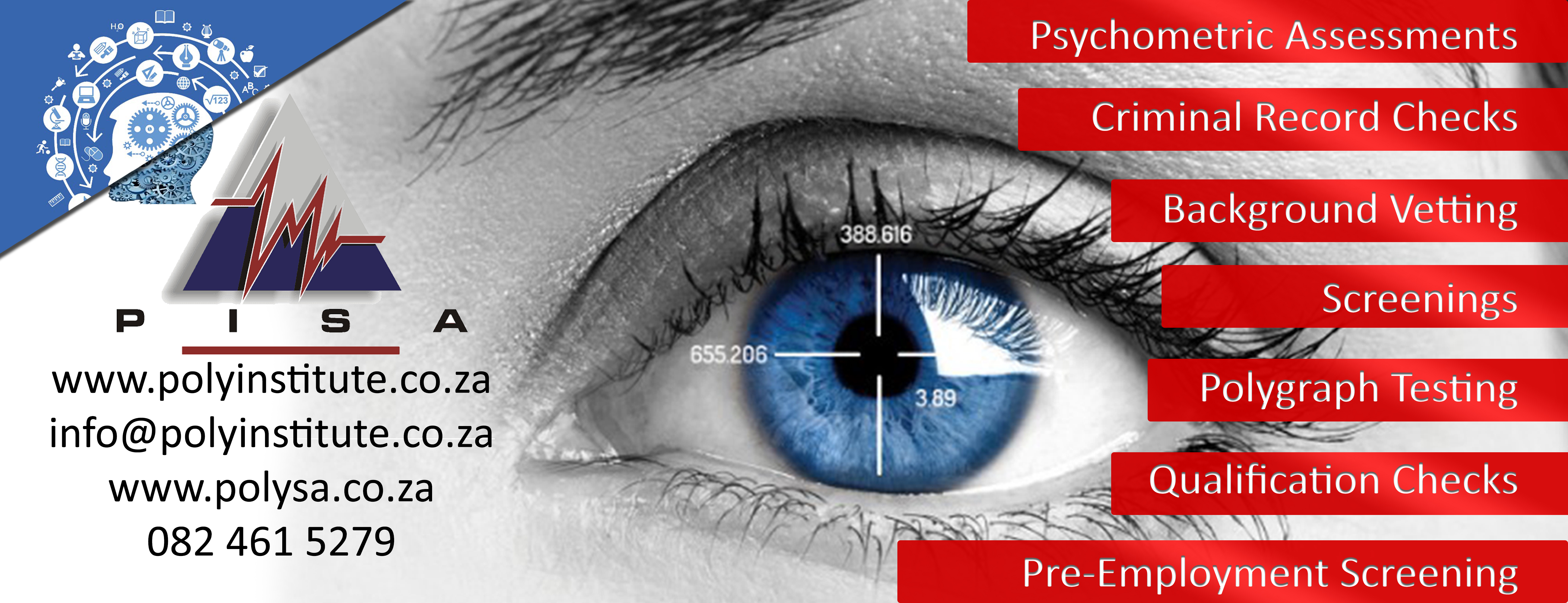Polygraph Tests and the Law in South Africa
In South Africa there is currently no legislation regulating the use of the polygraph. Therefore, there is nothing prohibiting or preventing the submission of polygraph results to corroborate other evidence in our Courts of Law. It is also legal to request employees to voluntarily subject themselves to polygraph examinations.
It is very important to note that polygraph results were never intended to provide irrefutable probative evidence to a Court of Law. The polygraph is an investigative tool and polygraph results should be used primarily to assist investigators in narrowing investigations by identifying suspects and collecting information relevant to the investigation. Polygraph results should therefore be submitted to a Court only when they can corroborate other admissible evidence and assist the Court in reaching a verdict.
Proper polygraph procedures comply in every respect with the contents of the Constitution and the Labour Relations Act, and actively promote fair labour practices and respect for the human rights of the examinee, because it affords the innocent person an opportunity to be heard and to prove their innocence.
Polygraph results can be utilized in labour disputes and disciplinary enquiries. The acceptance of polygraph examination results will depend largely on the credibility and qualification of the examiner and the manner in which the examination was conducted.

Polygraph results have been submitted and acknowledged in a number of Commission for Conciliation, Mediation and Arbitration (CCMA) cases recently, and they are frequently submitted during internal investigations and disciplinary hearings to corroborate other evidence. It appears that the question is not so much whether polygraph test results should be allowed, but rather how much weight they should carry. “Within the legislative framework and the general rules of evidence, the question really is how much weight will be accorded to polygraph test results, and the answer to this is probably dependant upon the type of test used and the qualifications and experience of the individual examiner” (Christianson, M. Industrial Law Journal 2000 vol 21:34).
The Status of the Polygraph in the Commission for Conciliation, Mediation and Arbitration (CCMA)
In terms of South African Law, there is no legislation regarding the polygraph, either for or against the use thereof. Most of the respected legal experts are in agreement that when a person consents to a polygraph examination, it cannot be seen as done in contradiction of the constitution.
In recent years a number of interesting developments took place which brought the issue of Polygraph Evidence to the fore and in some instances into the spotlight.
According to the well-respected Edward Nathan and Friedland Inc Attorneys in Sandton, the case of Mncube & Cash Paymaster Services (Pty) Ltd KN1583, 6 May 1997 showed that the Commissioner accepted the polygraphist as an expert witness whose evidence needed to be tested for reliability.
According to the commissioner in Zoned & one other & Floccotan (Pty) Ltd KN2845, of 28 August 1997, the court went too far when rejecting lie detector evidence in the case of Mahlangu v Cim Deltak. The duty of the commissioner was seen to be to determine the admissibility and reliability of the evidence but the respondent did not prove the reliability thereof by calling upon the testimony of the expert. A similar finding was made in the instance of SACCAWU & Sterns Jewellery NP144, 30 April 1997.
In Hotellica Trade Union & San Angelo Spur WE3799, 24 November 1997, it was held that the lie detector test may not be interpreted as implying guilt but may be regarded as an aggravating factor especially where there is other evidence of misconduct.
By now most IR practitioners are familiar with the case of Harmse & Rainbow Farms (Pty) Ltd. In this matter the employee was one of 15 who had access or potential access to the missing equipment. When offered an exculpatory polygraph examination, Mr Harmse at first declined then changed his mind and did complete the test which he was the only person to fail. When offered another examination which could have led to his total pardon, he declined the opportunity and was then dismissed for reasons of breach of trust. The employer then dismissed him on the basis of not theft, but breach of trust relationship. This position and decision of the employer were upheld by the CCMA. Furthermore it was noted that:
- the employer has the right to dismiss an employee whom it can no longer trust provided there are reasonable grounds for such loss of trust based on the actions of the employee.
- the employer had reason to request polygraph examination as a result of suffering a substantial financial loss.
- an employer has a right in circumstances of such loss to exert some pressure on employees to cooperate in the investigation of the misconduct or crime.
- granting of the option of a re-examination may be seen as a show of good faith by the employer.
- the polygraph examination phase was seen as an integral and crucial part of the investigation.
- the advance notification in writing of the examinees of the intention of the employer to institute polygraph examination as part of the investigation was seen to be fair.
- the procedure was not viewed as an unfair labour practice nor as an infringement of the fundamental rights of the examinee.
- the procedure underscored the fact that the examination was considered as voluntary.
How Can We Help You?
Do not hesitate to contact the PISA Integrity Assessment Centre and let our years of experience work for you. Whether you would like to make a booking, ask for a consultation or would like more information on how our multitude of products and service can benefit your business, we are ready and eager to assist in any way we can.
Would you like to contact us for a booking or consultation?
Would you like to know more about our products and services?
Would you like to know more about the company?
Download the PISA Integrity Assessment Centre A4 advert: Download
Download the PISA Integrity Assessment Centre small advert: Download
Download the PISA Integrity Assessment Centre Tri-Fold Flyer: Download

For more information specifically related to polygraph examinations, please visit The Polygraph Institute of South Africa.
For more information specifically related to pre-employment screenings, please visit the Pre-Employment Screening Centre.
For more information specifically related to our psychometric assessments, please visit the PISA Psychometric Assessment Centre.